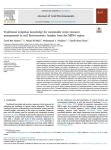Ben Hassen T., El Bilali H., Allahyari M.S., Chatti C.B. (2025). Traditional irrigation knowledge for sustainable water resource management in arid Environments: insights from the MENA region. Journal of Arid Environments, 01/12/2025, vol. 231, p. 105466.
http://doi.org/10.1016/j.jaridenv.2025.105466
http://doi.org/10.1016/j.jaridenv.2025.105466
| Titre : | Traditional irrigation knowledge for sustainable water resource management in arid Environments: insights from the MENA region (2025) |
| Auteurs : | T. Ben Hassen ; H. El Bilali ; M.S. Allahyari ; C.B. Chatti |
| Type de document : | Article |
| Dans : | Journal of Arid Environments (vol. 231, December 2025) |
| Article en page(s) : | p. 105466 |
| Langues : | Anglais |
| Langues du résumé : | Anglais |
| Catégories : |
Catégories principales 07 - ENVIRONNEMENT ; 7.3 - Eau. Gestion de l'EauThésaurus IAMM GESTION DES EAUX ; DURABILITE ; IRRIGATION ; CONNAISSANCE INDIGENE ; SAVOIR FAIRE ; TECHNOLOGIE TRADITIONNELLE ; MOYEN ORIENT ; AFRIQUE DU NORD ; TUNISIE |
| Résumé : | Integrating traditional irrigation knowledge with modern sustainable water management practices offers valuable solutions to water scarcity in arid regions. The Middle East and North Africa (MENA) region faces significant climate challenges, including low rainfall, rising temperatures, and recurrent droughts. As sustainable agriculture requires harmony between humans and nature, managing scarce water resources is crucial for adapting to climate change and ensuring agricultural resilience in these arid environments. Communities in this region have historically addressed water scarcity by developing traditional and locally adapted irrigation techniques, such as Qanats and rainwater harvesting. These methods have been essential in conserving water resources and mitigating environmental stressors that impact agricultural productivity. This paper examines how traditional irrigation practices contribute to the sustainability and resilience of agricultural systems and the preservation of fragile arid ecosystems in the face of climate uncertainties. The study provides: (i) an analysis of water scarcity issues and the effects of climate change on arid ecosystems in the MENA region, (ii) an exploration of traditional irrigation knowledge and technologies, emphasizing their role in water conservation and ecosystem health, and (iii) a discussion of socio-economic, institutional, and technological barriers to broader adoption of these practices. Case studies from various MENA countries illustrate how traditional practices enhance resilience and support conservation efforts. The paper highlights the importance of culturally appropriate strategies integrating human dimensions into ecosystem management, fostering sustainable and adaptive solutions for the region's challenges. |
| Cote : | En ligne |
| URL / DOI : | http://doi.org/10.1016/j.jaridenv.2025.105466 |







